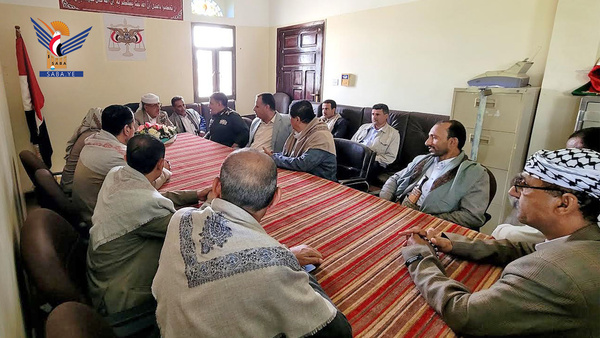
Hajjah – Saba:
An official meeting was held on Tuesday in Hajjah governorate to discuss mechanisms for enhancing coordination between judicial, security, and local authorities in order to bring justice closer to citizens and strengthen community protection.
The meeting, chaired by governor Hilal al-Soufi, included the Heads of the Court and the Appeal Prosecution, Judge Hussein al-Houthi and Judge Abdullah al-Ahmar, respectively, as well as Deputy Governor Mohammed al-Qadhi, Mobilization Officer Hamoud al-Maghrabi, Security Director Brigadier General Hassan al-Qasimi, and Head of the Grievances Redress Authority Branch Judge Abdulmajid Sharaf al-Din.
Discussions highlighted the need to address challenges facing judicial enforcement, reinforce judicial independence, and ensure the implementation of court rulings.
The meeting stressed the importance of strengthening coordination between the judiciary and security agencies to uphold legal procedures during criminal apprehension, prevent impunity, expedite case resolution, and ensure integrated efforts in safeguarding public and private property and resolving issues hindering judicial enforcement operations.
An official meeting was held on Tuesday in Hajjah governorate to discuss mechanisms for enhancing coordination between judicial, security, and local authorities in order to bring justice closer to citizens and strengthen community protection.
The meeting, chaired by governor Hilal al-Soufi, included the Heads of the Court and the Appeal Prosecution, Judge Hussein al-Houthi and Judge Abdullah al-Ahmar, respectively, as well as Deputy Governor Mohammed al-Qadhi, Mobilization Officer Hamoud al-Maghrabi, Security Director Brigadier General Hassan al-Qasimi, and Head of the Grievances Redress Authority Branch Judge Abdulmajid Sharaf al-Din.
Discussions highlighted the need to address challenges facing judicial enforcement, reinforce judicial independence, and ensure the implementation of court rulings.
The meeting stressed the importance of strengthening coordination between the judiciary and security agencies to uphold legal procedures during criminal apprehension, prevent impunity, expedite case resolution, and ensure integrated efforts in safeguarding public and private property and resolving issues hindering judicial enforcement operations.